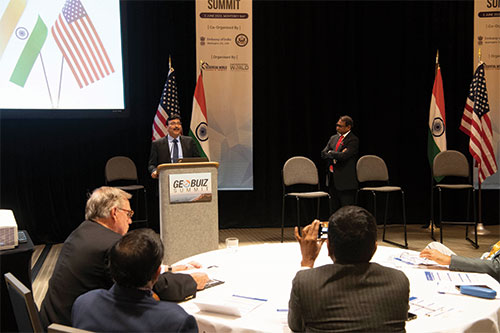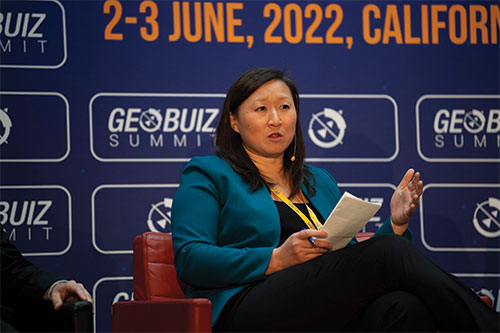
The geospatial industry is the next ‘big opportunity’, emerging as a hotspot of technology marketplace and innovation – both for advancing the market itself, and augmenting the business process of mainstream IT, Engineering, and Autonomous industries. Steering the wheel of the knowledge economy, the geospatial industry and its innovations are fundamental in simplifying complexities of varied technology and workflow systems and provide agile and flexible solutions to address the problems of world economy and society.
From mechanization to automation, from industry 1.0 to industry 4.0, from big data to customized applications and digital services – all these technology innovations implemented across all industries and business functions amplify impact and bring unprecedented efficiencies across industries, socio-economic and technological domains – for a better sustainable and resilient world of tomorrow.
After a very successful GeoBuiz Summit in 2022, the Summit in its 2023 edition, will facilitate interactions, market engagement, and collaborations among the leaders representing the gamut of geospatial and allied (technologies) industries and associated vertical industries. The discussions at the summit will highlight the trends and directions in technology innovation for simplifying the complexities associated with workflows and elaborate on the amplified impact of technology use for these workflows.
You don’t want to miss this! Join us!
The rise of geospatial and 4IR ecosystem’s paradigm within the varied vertical industry ecosystem prepares the world economy and society to dig even deeper into the implementation of technology as a critical enabler for simplified workflow enablement.
At GeoBuiz Summit, the headline and the vertical tracks will prepare enterprises to co-transform and co-evolve to be agile and deliver long-withstanding impact.
 Glean how businesses leverage geospatial
information and technology to simplify the different
workflows and amplify their impact
Glean how businesses leverage geospatial
information and technology to simplify the different
workflows and amplify their impact
 Learn how user sectors can become more agile
by geospatial mindshare using real-time data and
insights
Learn how user sectors can become more agile
by geospatial mindshare using real-time data and
insights
 Witness collaborations and partnerships evolving the
technology ecosystem for agile workflows
Witness collaborations and partnerships evolving the
technology ecosystem for agile workflows
 Understand the power of geospatial and the allied
technology ecosystem in delivering escalated impact
Understand the power of geospatial and the allied
technology ecosystem in delivering escalated impact



Participants
Panelists
Countries
Sectors

Policy Makers

Federal Agencies

Technology Innovators

System Integrators

Startups

Investors

End-Users


There is a broadening view of what GeoIntelligence is and it’s being influenced by the commercialization of space technology. We are really at the infancy of what we can do with this big data and the impact which can come with the analysis of it.

Geospatial technology has really become integrated into the fabric of the organization workflows and processes. Our technology is being used to help people make better decisions and improve the lives of the stakeholders.

Geospatial Knowledge Infrastructure is about an open ecosystem of providers that provide on-demand information that helps decision makers, enables workflows, and helps us to be more efficient to do a lot of things together, and what the world is striving to do.

There are so many opportunities to use geospatial technology and the one trillion-dollar spending in infrastructure bill is something we should all be thinking about, because federal and state governments can do it better using all our data. This is the next big opportunity.

The GPS Receiver population across the earth is going to explode from 7 billion to 21 billion in the next few years. And it’s not the explosion of receivers, it’s explosion of use cases from crowd-sourced and shared applications like Waze and Uber to GPS occultation, for remote sensing applications, to name a few.

Map is not anymore, a piece of paper, it’s not a 2D thing, it’s not a static thing – it’s becoming an experience, it’s becoming 3D. Today, it’s not even a map for the human beings, but it’s a map for the machines, for the autonomous, for the robots – and this is where HD Maps come into place.


1 PORTOLA PLAZA, MONTEREY, CA-93940, USA